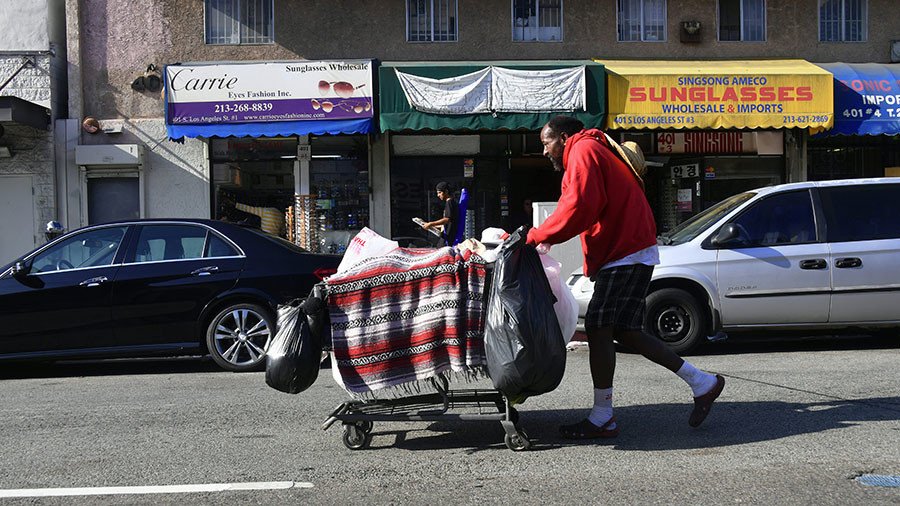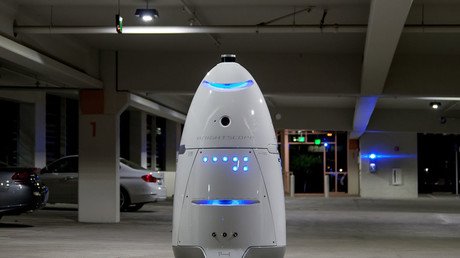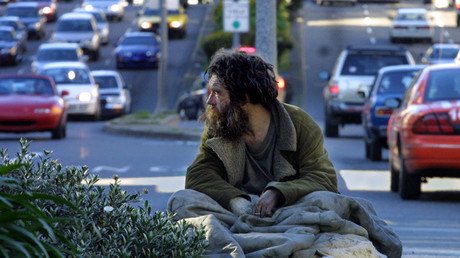San Francisco animal shelter hires robot to keep homeless people away

One of the largest animal rights organizations in the US aims to eliminate animal homelessness in San Francisco, California. Now it is using a robot to deter homeless humans from setting up tents on its property.
Earlier this month, the San Francisco Society for Prevention of Cruelty to Animals (SFSPCA) hired a robot to alert authorities when homeless people set up encampments in its parking lot and in the sidewalks surrounding its building.
Rather than using physical force to remove homeless people and their belongings, the robot uses a system of lasers, cameras, a thermal sensor and GPS to alert the authorities. At five feet tall and weighing 500 pounds, the robot can read up to 300 license plates per minute and send alerts when it identifies people on a “blacklist.”
Robots are being used to deter homeless people from setting up camp in San Francisco https://t.co/vgbIBJMqYzpic.twitter.com/z74K9vsTH2
— Business Insider (@businessinsider) December 12, 2017
Named K9, the robot is a part of a fleet that patrols malls, sports arenas, and corporate campuses of companies including Microsoft and Uber. Owned by San Francisco bay area company Knightscope, the robots are available for just $7 per hour – far less than San Francisco’s $14 per hour minimum wage.
Here it is in action pic.twitter.com/nSBQUmKwk1
— Sam Dodge (@samueldodge) December 9, 2017
“We weren’t able to use the sidewalks at all when there’s needles and tents and bikes, so from a walking standpoint I find the robot much easier to navigate than an encampment,” SFSPCA president Jennifer Scarlett told the International Business Times.
In 2012, the SFSPCA announced its plan to make San Francisco “the first city in the nation to end animal homelessness” by 2020. Yet the city also suffers from an acute human homelessness issues, particularly visible in the rapidly gentrifying Mission district. The rising cost of living due to the influx of high-wage employees in the nearby Silicon Valley, San Francisco has the seventh-worst homelessness problem in the US, according to Department of Housing and Urban Development data.
The SFSPCA has faced considerable backlash since it first deployed the robot in November. A group of homeless people allegedly “put a tarp over it, knocked it over and put barbecue sauce on all the sensors,” Scarlett said.
One Twitter user claimed to have seen feces smeared on the robot. Local resident Fran Taylor said the robot approached her while taking her dog for a walk around the SFSPCA’s campus. The dog barked and lunged and the robot, coming to a stop just 10 feet away and only after Taylor yelled at it.
“I can understand being scared about a new technology on the street, and we should be asking questions about it, but we should probably be a little bit angry that a nonprofit has to spend so much on security at the same time,” Scarlett said, adding that the SFSPCA hopes to a resolution to “the complicated issues around homelessness.”
The use of the robot was widely derided on social media.
“It's disheartening that @sfspca would show such a lack of compassion to our houseless neighbors,” the National Law Center on Homelessness and Poverty tweeted.
It's disheartening that @sfspca would show such a lack of compassion to our houseless neighbors. https://t.co/mN8wLprKOP
— NLCHP (@NLCHPhomeless) December 11, 2017
Twitter user @historyinflicks poked fun at “liberal coastal elites.”
Red states are awful places filled with terrible people. I'm proud to be a coastal elite in liberal San Francisco where we deploy killer cyborgs to rid our fair streets of filthy homeless vermin. https://t.co/zJDyv8fNgY
— maple cocaine (@historyinflicks) December 13, 2017
Robots are being increasingly used around San Francisco for a variety of jobs, from delivery vehicles to rental agents, though they face opposition from pedestrian advocacy groups. The city has yet to issue wide ranging regulations on public use of robots, but it ordered the SFSPCA to keep the robot off of the streets, threatening fines of $1,000 per day.
Vehicle break-ins are down since the SFSPCA began using the robot in early November, Scarlett told the Business Times, and homeless people have stopped building encampments. While she can’t attribute those results to the robot, they are correlated, she said.
SFSPCA has not returned RT’s calls for comment. While on hold, a recording asked to “help us end the cycle of homelessness” ‒ of cats.















